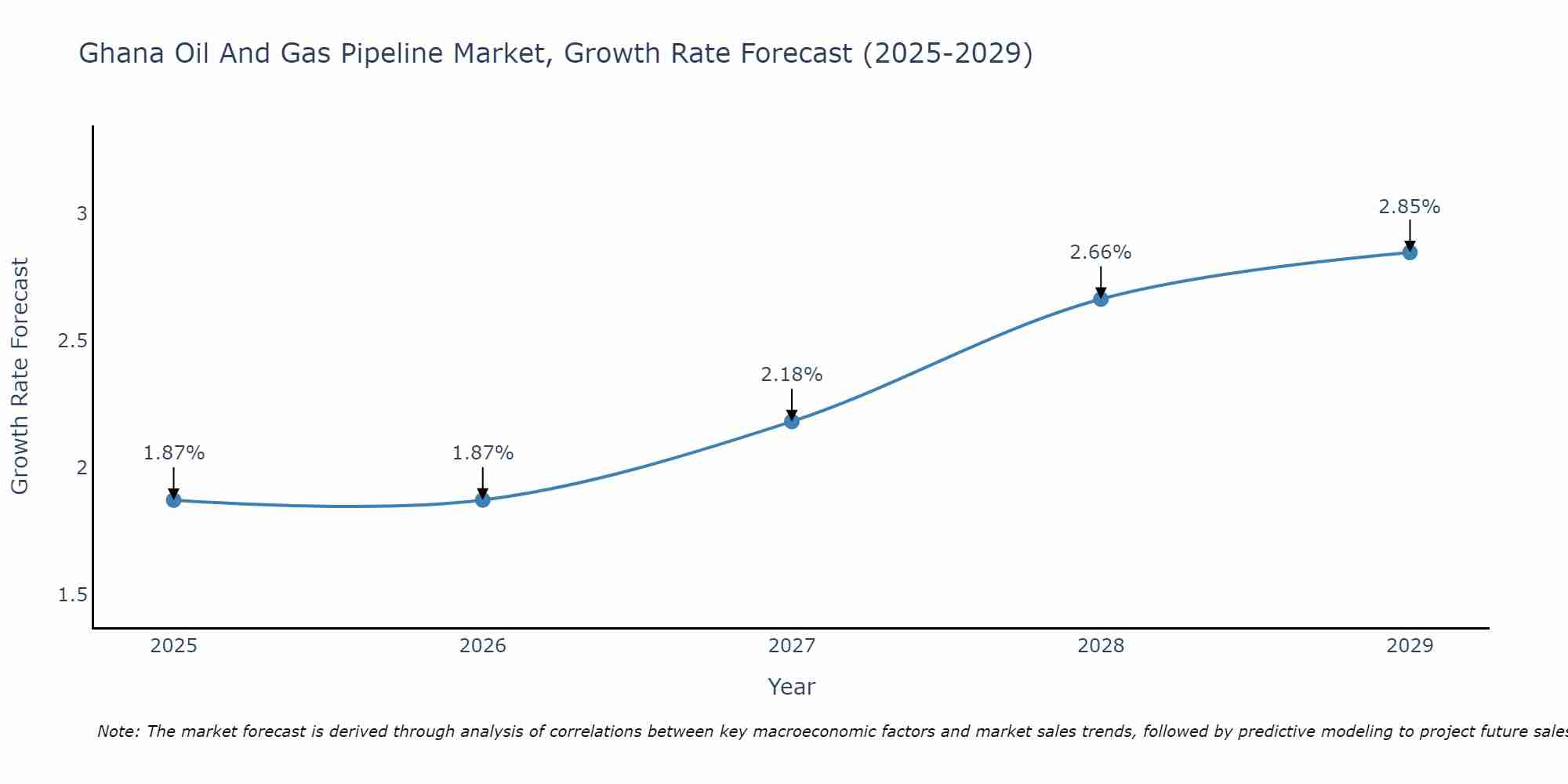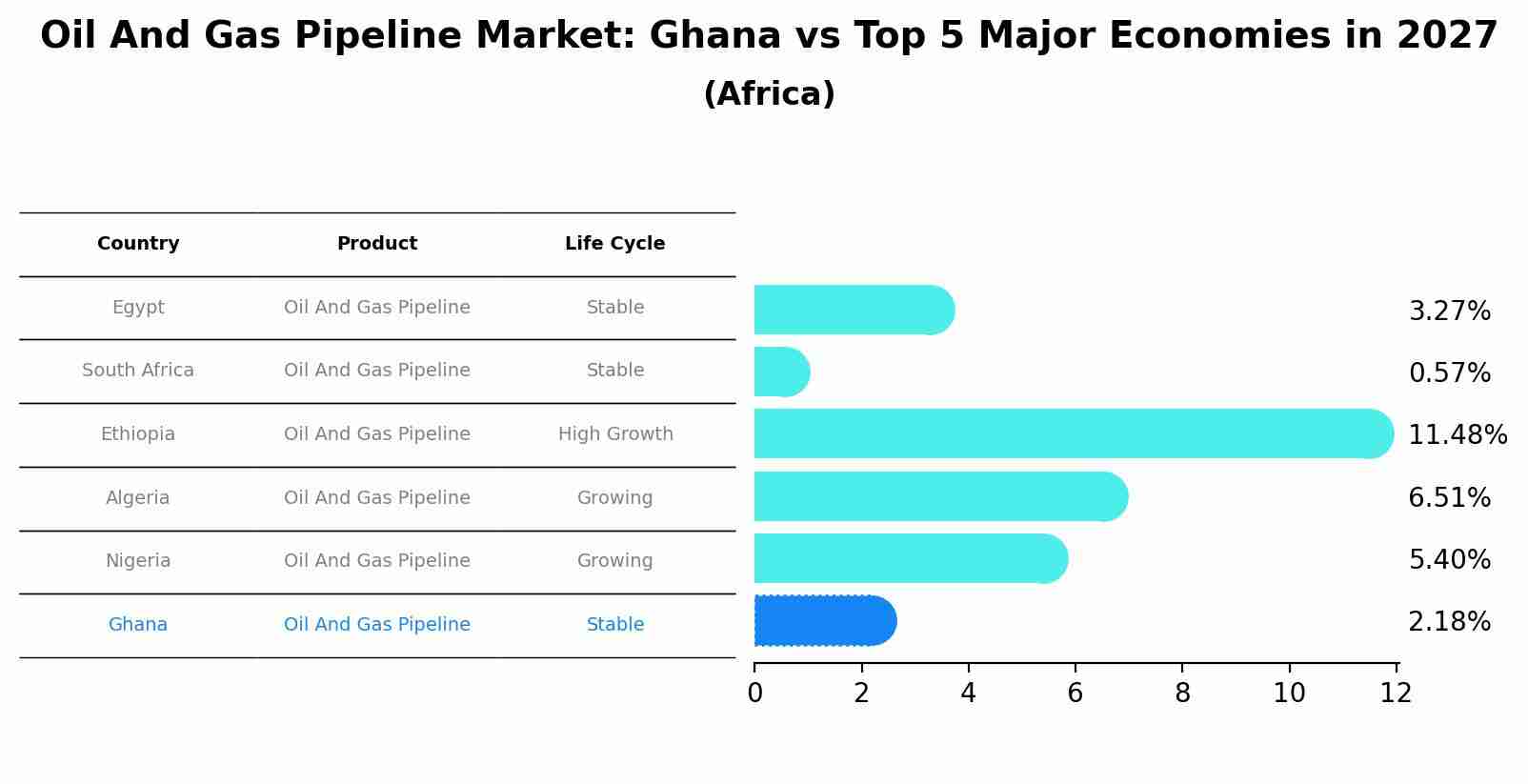Ghana Oil And Gas Pipeline Market (2025-2031) Outlook | Revenue, Size, Analysis, Share, Value, Forecast, Growth, Industry, Trends & Companies
| Product Code: ETC377336 | Publication Date: Aug 2022 | Updated Date: Jul 2025 | Product Type: Market Research Report | |
| Publisher: 6Wresearch | Author: Summon Dutta | No. of Pages: 75 | No. of Figures: 35 | No. of Tables: 20 |
Ghana Oil And Gas Pipeline Market Size Growth Rate
The Ghana Oil And Gas Pipeline Market is likely to experience consistent growth rate gains over the period 2025 to 2029. Commencing at 1.87% in 2025, growth builds up to 2.85% by 2029.

Oil And Gas Pipeline Market: Ghana vs Top 5 Major Economies in 2027 (Africa)
By 2027, the Oil And Gas Pipeline market in Ghana is anticipated to reach a growth rate of 2.18%, as part of an increasingly competitive Africa region, where Egypt remains at the forefront, supported by South Africa, Ethiopia, Algeria and Nigeria, driving innovations and market adoption across sectors.

Ghana Oil And Gas Pipeline Market Synopsis
The Ghana Oil and Gas Pipeline Market is experiencing steady growth driven by increasing exploration and production activities in the region. The market is primarily dominated by the transportation of crude oil and natural gas across the country to refineries and distribution points. Key players in the market include Ghana National Petroleum Corporation (GNPC) and other international oil companies operating in the region. The government`s initiatives to attract investments in the oil and gas sector, coupled with the discovery of new reserves, are expected to further boost the demand for pipeline infrastructure in Ghana. However, challenges such as regulatory uncertainties, environmental concerns, and security risks pose potential hurdles for market expansion. Overall, the Ghana Oil and Gas Pipeline Market presents significant opportunities for infrastructure development and investment in the coming years.
Ghana Oil And Gas Pipeline Market Trends
The Ghana Oil and Gas Pipeline Market is currently experiencing significant growth driven by increasing investments in infrastructure development in the country`s oil and gas sector. The government`s focus on expanding the pipeline network to enhance the transportation of oil and gas products is a key trend in the market. Additionally, there is a growing emphasis on the adoption of advanced technologies to improve pipeline efficiency, safety, and reliability. The discovery of new oil and gas reserves in Ghana is also driving the demand for pipeline infrastructure to support exploration and production activities. Overall, the market is projected to witness steady growth in the coming years as the country continues to invest in expanding its oil and gas pipeline network to meet the growing energy demands domestically and regionally.
Ghana Oil And Gas Pipeline Market Challenges
In the Ghana oil and gas pipeline market, several challenges are faced, including regulatory hurdles and permitting delays, inadequate infrastructure development, security concerns, and environmental risks. The regulatory environment in Ghana can be complex and slow-moving, leading to delays in project approvals and implementation. Additionally, the lack of sufficient pipeline infrastructure hinders the efficient transportation of oil and gas products across the country. Security threats, such as vandalism and theft, pose risks to the integrity of pipelines and disrupt operations. Moreover, environmental concerns related to pipeline leaks and spills require stringent monitoring and mitigation efforts to minimize negative impacts on local ecosystems. Addressing these challenges will be crucial for the sustainable growth and development of the Ghana oil and gas pipeline market.
Ghana Oil And Gas Pipeline Market Investment Opportunities
Investment opportunities in the Ghana oil and gas pipeline market include participation in the construction and expansion of pipeline infrastructure to support the country`s growing energy sector. With Ghana`s government actively promoting the development of its oil and gas industry, there is a need for investments in pipeline projects to enhance transportation capacity and efficiency. Investors can consider opportunities in engineering, procurement, and construction (EPC) contracts for pipeline projects, as well as investing in pipeline operation and maintenance services. Additionally, there is potential for investment in technology solutions to improve pipeline safety, monitoring, and automation systems. Overall, the Ghana oil and gas pipeline market presents opportunities for investors looking to capitalize on the country`s energy sector growth and infrastructure development.
Jordan Agar Market Government Policies
The government of Ghana has implemented several policies related to the oil and gas pipeline market to promote sustainable development and ensure the efficient transportation of resources. These policies include the Petroleum (Local Content and Local Participation) Regulations, which aim to increase local participation in the sector through the reservation of certain activities for indigenous Ghanaian companies. Additionally, the government has established the Ghana National Gas Company to oversee the development of the gas infrastructure and promote gas utilization in the country. Furthermore, there are regulations in place to ensure the safety and integrity of the pipelines, including regular inspections and maintenance requirements to prevent environmental damage and ensure the reliability of the transportation system. Overall, these policies demonstrate the government`s commitment to fostering a competitive and sustainable oil and gas pipeline market in Ghana.
Ghana Oil And Gas Pipeline Market Future Outlook
The future outlook for the Ghana Oil and Gas Pipeline Market appears promising, driven by increasing investments in the country`s energy sector and ongoing exploration activities. The discovery of new oil and gas reserves in the region is expected to drive the demand for pipeline infrastructure to transport these resources efficiently. Additionally, the government`s focus on developing the country`s infrastructure to support the oil and gas industry is likely to spur further growth in the pipeline market. Technological advancements in pipeline construction and maintenance, along with a growing emphasis on environmental sustainability, are also expected to shape the market`s future trajectory. Overall, the Ghana Oil and Gas Pipeline Market is anticipated to witness steady growth in the coming years, presenting opportunities for industry stakeholders to capitalize on the country`s evolving energy landscape.
Key Highlights of the Report:
- Ghana Oil And Gas Pipeline Market Outlook
- Market Size of Ghana Oil And Gas Pipeline Market, 2024
- Forecast of Ghana Oil And Gas Pipeline Market, 2031
- Historical Data and Forecast of Ghana Oil And Gas Pipeline Revenues & Volume for the Period 2021 - 2031
- Ghana Oil And Gas Pipeline Market Trend Evolution
- Ghana Oil And Gas Pipeline Market Drivers and Challenges
- Ghana Oil And Gas Pipeline Price Trends
- Ghana Oil And Gas Pipeline Porter's Five Forces
- Ghana Oil And Gas Pipeline Industry Life Cycle
- Historical Data and Forecast of Ghana Oil And Gas Pipeline Market Revenues & Volume By Location of Deployment for the Period 2021 - 2031
- Historical Data and Forecast of Ghana Oil And Gas Pipeline Market Revenues & Volume By Onshore for the Period 2021 - 2031
- Historical Data and Forecast of Ghana Oil And Gas Pipeline Market Revenues & Volume By Offshore for the Period 2021 - 2031
- Historical Data and Forecast of Ghana Oil And Gas Pipeline Market Revenues & Volume By Type for the Period 2021 - 2031
- Historical Data and Forecast of Ghana Oil And Gas Pipeline Market Revenues & Volume By Crude Oil Pipeline for the Period 2021 - 2031
- Historical Data and Forecast of Ghana Oil And Gas Pipeline Market Revenues & Volume By Gas Pipeline for the Period 2021 - 2031
- Ghana Oil And Gas Pipeline Import Export Trade Statistics
- Market Opportunity Assessment By Location of Deployment
- Market Opportunity Assessment By Type
- Ghana Oil And Gas Pipeline Top Companies Market Share
- Ghana Oil And Gas Pipeline Competitive Benchmarking By Technical and Operational Parameters
- Ghana Oil And Gas Pipeline Company Profiles
- Ghana Oil And Gas Pipeline Key Strategic Recommendations
Frequently Asked Questions About the Market Study (FAQs):
- Single User License$ 1,995
- Department License$ 2,400
- Site License$ 3,120
- Global License$ 3,795
Search
Thought Leadership and Analyst Meet
Our Clients
Related Reports
- Canada Oil and Gas Market (2026-2032) | Share, Segmentation, Value, Industry, Trends, Forecast, Analysis, Size & Revenue, Growth, Competitive Landscape, Outlook, Companies
- Germany Breakfast Food Market (2026-2032) | Industry, Share, Growth, Size, Companies, Value, Analysis, Revenue, Trends, Forecast & Outlook
- Australia Briquette Market (2025-2031) | Growth, Size, Revenue, Forecast, Analysis, Trends, Value, Share, Industry & Companies
- Vietnam System Integrator Market (2025-2031) | Size, Companies, Analysis, Industry, Value, Forecast, Growth, Trends, Revenue & Share
- ASEAN and Thailand Brain Health Supplements Market (2025-2031) | Strategy, Consumer Insights, Analysis, Investment Trends, Opportunities, Growth, Size, Share, Industry, Revenue, Segments, Value, Segmentation, Supply, Forecast, Restraints, Outlook, Competition, Drivers, Trends, Demand, Pricing Analysis, Competitive, Strategic Insights, Companies, Challenges
- ASEAN Bearings Market (2025-2031) | Strategy, Consumer Insights, Analysis, Investment Trends, Opportunities, Growth, Size, Share, Industry, Revenue, Segments, Value, Segmentation, Supply, Forecast, Restraints, Outlook, Competition, Drivers, Trends, Demand, Pricing Analysis, Competitive, Strategic Insights, Companies, Challenges
- Europe Flooring Market (2025-2031) | Outlook, Share, Industry, Trends, Forecast, Companies, Revenue, Size, Analysis, Growth & Value
- Saudi Arabia Manlift Market (2025-2031) | Outlook, Size, Growth, Trends, Companies, Industry, Revenue, Value, Share, Forecast & Analysis
- Uganda Excavator, Crane, and Wheel Loaders Market (2025-2031) | Strategy, Consumer Insights, Analysis, Investment Trends, Opportunities, Growth, Size, Share, Industry, Revenue, Segments, Value, Segmentation, Supply, Forecast, Restraints, Outlook, Competition, Drivers, Trends, Demand, Pricing Analysis, Competitive, Strategic Insights, Companies, Challenges
- Rwanda Excavator, Crane, and Wheel Loaders Market (2025-2031) | Strategy, Consumer Insights, Analysis, Investment Trends, Opportunities, Growth, Size, Share, Industry, Revenue, Segments, Value, Segmentation, Supply, Forecast, Restraints, Outlook, Competition, Drivers, Trends, Demand, Pricing Analysis, Competitive, Strategic Insights, Companies, Challenges
Industry Events and Analyst Meet
Whitepaper
- Middle East & Africa Commercial Security Market Click here to view more.
- Middle East & Africa Fire Safety Systems & Equipment Market Click here to view more.
- GCC Drone Market Click here to view more.
- Middle East Lighting Fixture Market Click here to view more.
- GCC Physical & Perimeter Security Market Click here to view more.
6WResearch In News
- Doha a strategic location for EV manufacturing hub: IPA Qatar
- Demand for luxury TVs surging in the GCC, says Samsung
- Empowering Growth: The Thriving Journey of Bangladesh’s Cable Industry
- Demand for luxury TVs surging in the GCC, says Samsung
- Video call with a traditional healer? Once unthinkable, it’s now common in South Africa
- Intelligent Buildings To Smooth GCC’s Path To Net Zero


















